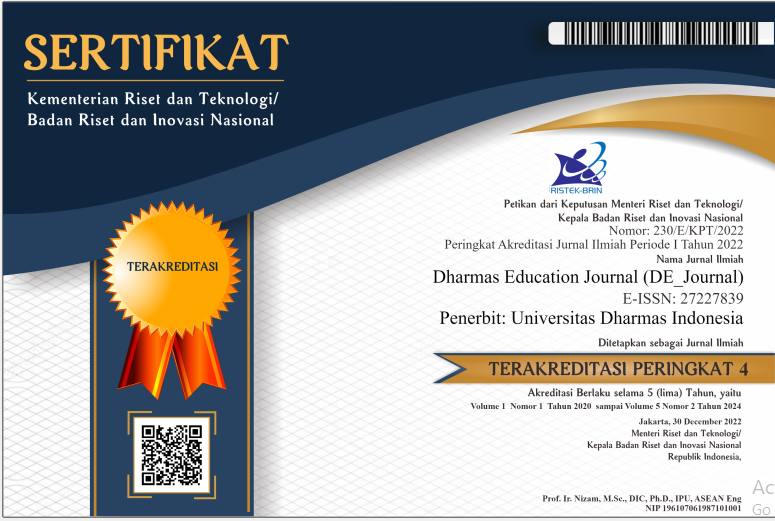UTILIZING SHORT STORIES TO IMPROVE VOCABULARY OF 8th GRADERS JUNIOR HIGH SCHOOL
DOI:
https://doi.org/10.56667/de_journal.v4i1.989Keywords:
English short stories, vocabulary, perceptionAbstract
This study was conducted to analyze the use of English short stories to improve the vocabulary mastery of 8th grade students at a public junior high school in Surabaya and their perceptions towards the use of English short stories. The researcher used the Classroom Action Research (CAR) method, involving 28 students (13 males, 15 females) with varying abilities. Data was collected through tests and interviews related to the use of English short stories. According to the analysis, this study revealed that English short stories helped students improve their vocabulary skills (Mean: 68 > 72 > 80). Moreover, the students also had a positive perception of the use of English short stories.
Downloads
References
Bai, Z. (2018). An analysis of english vocabulary learning strategies. Journal of Language Teaching and Research, 9(4), 849–855. https://doi.org/10.17507/jltr.0904.24
Beno, H. (2019). The Effectiveness of Using Short Story to Improve Students’ Vocabulary Mastery. Langua: Journal of Linguistics, Literature, and Language Education, 2(2), 32–40. www.jurnal.stkipkieraha.ac.id/langua
Bhatti, M. S., Iqbal, A., Rafique, Z., Noreen, S., & Tabassum, F. (2022). Short stories as an innovative EFL teaching technique to improve Pakistani elementary students’ English vocabulary. Journal on English as a Foreign Language, 12(2), 405–420. https://doi.org/10.23971/jefl.v12i2.4060
Nazara, P. (2019). Learning Vocabularies Using Short Stories at Primary School: Students� Perception. JET (Journal of English Teaching), 5(3), 157. https://doi.org/10.33541/jet.v5i3.1308
Sadiku, L. M. (2015). The Importance of Four Skills Reading, Speaking, Writing, Listening in a Lesson Hour. European Journal of Language and Literature, 1(1), 29. https://doi.org/10.26417/ejls.v1i1.p29-31
Siahaan, S. D. (2012). Using Story Reading Technique to Improve EFL Young Learners’ Vocabulary. JET (Journal of English Teaching), 2(3), 207. https://doi.org/10.33541/jet.v2i3.57
Siddiqua, A., Oljira, D., Dastjerdi, H. V., Ingleses, E., Ramadani, F., Olsson, H., Assessment, A. N., The, O. F., Of, P., Teaching, V., Wulandari, A. Y. U., Of, F., Training, T., Nation, P., Elsheikh, O., & Elmahdi, H. (2010). A STUDY ON 678’(176¶ DIFFICULTIES IN LEARNING VOCABULARY Rohmatillah Institut Agama Islam Negeri (IAIN) Raden Intan Lampung. 7(c), 89–94.
Suliyono, 2022. (2022). DOI: https://doi.org/10.33508/bw.v10i1.3429. 10(1), 1–14.
Violetta-Irene, K. (2015). The Use of Literature in the Language Classroom: Methods and Aims. International Journal of Information and Education Technology, 5(1), 74–79. https://doi.org/10.7763/ijiet.2015.v5.479
Downloads
Published
How to Cite
Issue
Section
License
Copyright (c) 2023 Dharmas Education Journal (DE_Journal)

This work is licensed under a Creative Commons Attribution-NonCommercial-NoDerivatives 4.0 International License.
Makalah yang disampaikan diasumsikan tidak mengandung bahan propietary yang tidak dilindungi oleh hak paten















